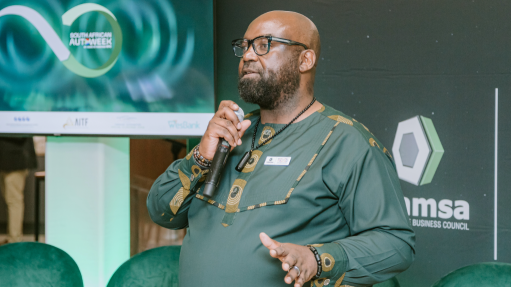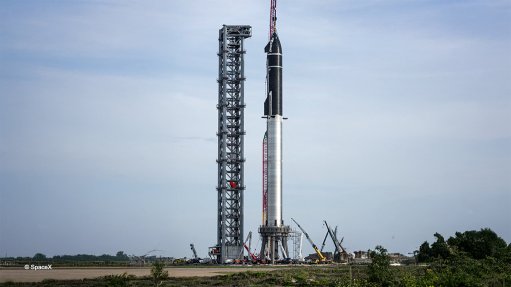CEO Magara’s COO role revives memories of New Denmark success
During his days as COO of New Denmark Colliery, Lonmin CEO Ben Magara recalls how former Anglo Coal CEO Tony Redman instructed him to do what it took to save New Denmark from closure in the 2000s.
He succeeded in putting the mine on a posi- tive new trajectory and, by the time he left New Denmark, employment at the colliery had doubled.
“I’m in that mode again and I love it,” says Magara of his additional COO role, following the resignation of Ben Moolman.
The New Denmark experience has left a deep impression: “That’s why my whole make- up is still about turning troubled mines around,” he says of deliberately taking on the COO role to lead and support his GMs to make sure that Lonmin delivers what it promised in the recapitalisation programme.
All are working to his key rules of safety, relationships, production and costs.
“If you can deliver on safety and relationships, you’ll get the production and your unit costs will come down,” he says.
He was speaking to Mining Weekly in an interview that began bang on 07:00 as scheduled on a day that Magara left home at 04:15 and went to gym from 05:00 to 06:00.
He smiled broadly as he confessed his passion for getting dirty with the guys at the rockface and optimising performance underground, where he talks safety, production and bonuses.
“Once they know that it’s about safety and their targets, you’re sorted, and we need to get to that again,” he says, while pointing to the need for an elevated attendance record above the current 90% level.
A source of encouragement to him is that production is turning nicely upwards, buoyed by encouraging new cooperation between his company, the once-hostile Association of Mineworkers and Construction Union (AMCU) and the principal inspectorate of the Department of Mineral Resources.
He is delighted that this production uplift is forcing down unit costs.
At stake is the sustainability of Lonmin Platinum’s platinum assets, which he describes as the biggest and the best on the western limb of the Bushveld Complex.
He explains that four of Lonmin’s biggest shafts – the K3, Rowland, Saffy and 4B shafts – contribute close to 80% of total tonnage production and notes that all these shafts are well capitalised and can still produce at steady state going well into the future.
In addition, Lonmin’s concentrator plants and refinery are achieving improving recoveries.
Besides the company being sufficiently financially liquid, its recapitalisation is conservatively premised on low prices persisting.
The aim is to be at least cash neutral in this low-price environment.
The greatest requirement of its current sustainability drive is the avoidance of safety and labour disruptions.
It is targeting uninterrupted momentum and full workforce attendance, which will achieve cash generation, even in these tough times.
To give impetus to that momentum, the sound of the company’s amazing safety and production song plays appealingly as mineworkers descend underground on chairlifts, bringing smiles to their faces as they sing along about the importance of safety, watchfulness and production achievement.
This is a throwback to Magara’s time at New Denmark Colliery, when he involved award-winning singer Johnny Clegg in initia- tives to boost the morale of employees.
Regrettably, in years gone by, Lonmin spent billions of dollars on nonstarter ventures like Akanani and a failed mechanised mining bid.
Following the horrific Marikana massacre of 44 people in 2012 and the five-month strike of 2014, its new relationship with AMCU is nothing short of remarkable.
The removal of high-cost production, the cutting of capital expenditure and the curtailment of the employee complement by 6 000 positions were achieved in full liaison with AMCU.
What Magara found particularly encouraging was the uptick in production after the company’s management team accompanied the principal inspector of the Department of Mineral Resources and representatives of AMCU’s national office and its local branch offices in a tripartite effort to confront the current low prices.
“If we continue working as a collective, we’ll succeed,” Magara comments to Mining Weekly.
He speaks highly of the Public Investment Corporation, Lonmin’s biggest single shareholder with 29% of the shareholding, which he describes as being extremely supportive.
The tough new circumstances confronting Lonmin call for adaptive management that ensures delivery, no matter how painful.
Business unusual is the order of the day to ensure sustainability for the company, which has a mining licence that extends to 2037 and which is renewable to 2067.
Lonmin uses short message service (SMS) systems, media and newspapers and Magara and Lonmin communication manager Wendy Tlou talk on Madibeng FM radio regularly to get their message into the North West province and the platinum belt, the scene of the strike that endured from January 23 to June 24 in 2014.
The use of SMSes, which began during the five-month strike to ensure direct management communication with employees, has continued to be used to conduct snap opinion surveys, highlight priorities and communicate information to employees on a regular basis.
Magara’s view is that Lonmin managers should not abdicate their communication responsibility but instead use communication to empower supervisors, shift bosses and mine captains to take that control.
On the low platinum price, he foresees the price being lower for longer: “I think the platinum prices are still going to be very tough for a while,” he says.
He does not rule out the possibility of short-term pain having to be taken across the business and laments not having the money to deliver housing at the pace at which he would have wanted.
Personally, he has not taken a salary increase for three years and is a protagonist of taking short-term pain for long-term gain to ensure the sustainability of the business, which he puts above all else.
Comments
Press Office
Announcements
What's On
Subscribe to improve your user experience...
Option 1 (equivalent of R125 a month):
Receive a weekly copy of Creamer Media's Engineering News & Mining Weekly magazine
(print copy for those in South Africa and e-magazine for those outside of South Africa)
Receive daily email newsletters
Access to full search results
Access archive of magazine back copies
Access to Projects in Progress
Access to ONE Research Report of your choice in PDF format
Option 2 (equivalent of R375 a month):
All benefits from Option 1
PLUS
Access to Creamer Media's Research Channel Africa for ALL Research Reports, in PDF format, on various industrial and mining sectors
including Electricity; Water; Energy Transition; Hydrogen; Roads, Rail and Ports; Coal; Gold; Platinum; Battery Metals; etc.
Already a subscriber?
Forgotten your password?
Receive weekly copy of Creamer Media's Engineering News & Mining Weekly magazine (print copy for those in South Africa and e-magazine for those outside of South Africa)
➕
Recieve daily email newsletters
➕
Access to full search results
➕
Access archive of magazine back copies
➕
Access to Projects in Progress
➕
Access to ONE Research Report of your choice in PDF format
RESEARCH CHANNEL AFRICA
R4500 (equivalent of R375 a month)
SUBSCRIBEAll benefits from Option 1
➕
Access to Creamer Media's Research Channel Africa for ALL Research Reports on various industrial and mining sectors, in PDF format, including on:
Electricity
➕
Water
➕
Energy Transition
➕
Hydrogen
➕
Roads, Rail and Ports
➕
Coal
➕
Gold
➕
Platinum
➕
Battery Metals
➕
etc.
Receive all benefits from Option 1 or Option 2 delivered to numerous people at your company
➕
Multiple User names and Passwords for simultaneous log-ins
➕
Intranet integration access to all in your organisation
















